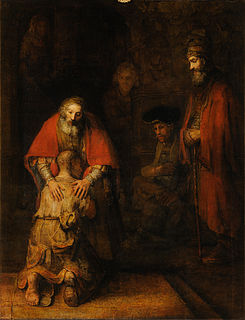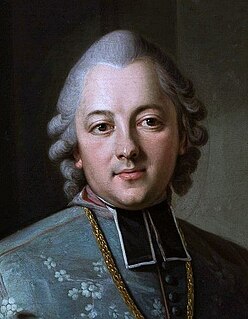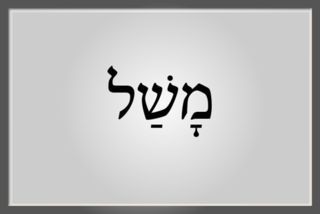 W
WA parable is a succinct, didactic story, in prose or verse, that illustrates one or more instructive lessons or principles. It differs from a fable in that fables employ animals, plants, inanimate objects, or forces of nature as characters, whereas parables have human characters. A parable is a type of metaphorical analogy.
 W
WThe allegory of the long spoons is a parable that shows the difference between heaven and hell by means of people forced to eat with long spoons. It is attributed to Rabbi Haim of Romshishok, as well as other sources.
 W
WThe parable of the blind men and an elephant originated in the ancient Indian subcontinent, from where it has been widely diffused. It is a story of a group of blind men who have never come across an elephant before and who learn and imagine what the elephant is like by touching it. Each blind man feels a different part of the elephant's body, but only one part, such as the side or the tusk. They then describe the elephant based on their limited experience and their descriptions of the elephant are different from each other. In some versions, they come to suspect that the other person is dishonest and they come to blows. The moral of the parable is that humans have a tendency to claim absolute truth based on their limited, subjective experience as they ignore other people's limited, subjective experiences which may be equally true.
 W
WFables and Parables, by Ignacy Krasicki (1735–1801), is a work in a long international tradition of fable-writing that reaches back to antiquity. Krasicki's fables and parables have been described as being, "[l]ike Jean de La Fontaine's [fables],... amongst the best ever written, while in colour they are distinctly original, because Polish." They are, according to Czesław Miłosz, "the most durable among Krasicki's poems."
 W
W"The Grand Inquisitor" is a poem contained within the text of Fyodor Dostoevsky's 1880 novel The Brothers Karamazov. It is recited by the character Ivan Karamazov, who questions his brother Alexei, a novice monk, about the possibility of a personal and benevolent God. "The Grand Inquisitor" is an important part of the novel and one of the best-known passages in modern literature because of its ideas about human nature and freedom, and its fundamental ambiguity. In a long soliloquy, the Grand Inquisitor defends the following ideas: only the principles of the devil can lead to mankind's universal unification: give man bread, control his conscience, and rule the world; Jesus limited himself to a small group of chosen ones, while the Catholic Church improved on his work and addresses all people; the church rules the world in the name of God, but with the devil's principles; Jesus was mistaken in holding man in high esteem.
 W
WHercules at the crossroads, also known as the Choice of Hercules and the Judgement of Hercules, is an ancient Greek parable attributed to Prodicus and known from Xenophon. It concerns the young Heracles/Hercules who is offered a choice between Vice and Virtue—a life of pleasure or one of hardship and honour. In the early modern period it became a popular motif in Western art.
 W
WA mashal is a short parable with a moral lesson or religious allegory, called a nimshal. Mashal is used also to designate other forms in rhetoric, such as the fable and apothegm. Talmudist Daniel Boyarin has recently defined משל as a process of "exemplification," seeing it as the sine qua non of Talmudic hermeneutics. He quotes Song of Songs Rabba: "until Solomon invented the משל, no one could understand Torah at all." The phenomenon has been compared to the more recent phenomenon of sampling in modern popular music, especially hip-hop.
 W
WThe parable of the broken window was introduced by French economist Frédéric Bastiat in his 1850 essay "Ce qu'on voit et ce qu'on ne voit pas" to illustrate why destruction, and the money spent to recover from destruction, is not actually a net benefit to society.
 W
WThe Richest Man in Babylon is a 1926 book by George S. Clason that dispenses financial advice through a collection of parables set 4,000 years ago in ancient Babylon. The book remains in print almost a century after the parables were originally published, and is regarded as a classic of personal financial advice.
 W
W"The Three Questions" is a short story by Russian author Leo Tolstoy first published in 1885 as part of the collection What Men Live By, and Other Tales. The story takes the form of a parable, and it concerns a king who wants to find the answers to what he considers the three most important questions in life.
 W
WWhite Dog is a 1982 American drama film, which Samuel Fuller directed from a screenplay he and Curtis Hanson had dramatized, which, in turn, they based on Romain Gary's 1970 novel of the same name. The film depicts the struggle of a dog trainer named Keys, who is black, trying to retrain a stray dog found by a young actress, that is a "white dog"—a dog trained to make vicious attacks upon, and to kill, any black person. Fuller uses the film as a platform to deliver a message against racism as it examines the question of whether racism is a treatable problem or an incurable condition.